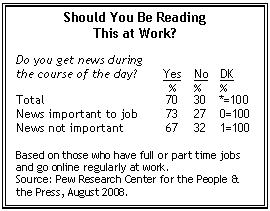by Richard C. Auxier, Research Assistant, Pew Research Center
The internet is allowing Americans to stay constantly informed and updated with the news of the day — on the company dollar. Of the 44% of the public who regularly go online while on the job, more than two-thirds (70%) check the news during the course of the day according to a recent Pew Research survey on media trends. While some of these people have jobs where the news is important to their work, the majority admit they could be fully efficient in performing their assigned tasks without keeping up to the minute on the latest foreign or domestic policy happening, or even the latest campaign gaffe or celebrity gossip.

Most Americans don’t need to keep abreast of the news while they’re on the clock. While keeping up with the news is important for four-in-ten Americans (41%) who regularly use the internet at work, a clear majority (59%) have no need for the latest news.
Yet those with no need for news are almost as likely to get news during the day as those who require news. Among those who go online regularly from the office, 67% say they get news at work even though it is not necessary for their jobs, almost as many as the 73% who get news and have jobs that require it. Interestingly, 27% of those who have jobs where the news is important don’t actually get it during the day.
Most of these news junkies are using the internet — in the safety of their cubicles — to get their fix. Those with and without a need for news are equally likely to surf the web for the latest happenings during the day (68% and 65% respectively). Nor is there any significant difference in frequency of news consumption at work between the needers (25%) and the not (24%) among those who get their news from the radio (through earphones, one hopes). However, those with news requirements are slightly more likely to get information from a television (27%) than are those who don’t need it (18%).
The quest for news at work might come as a surprise in the face of findings about the public’s news knowledge. The same Pew Research survey asked Americans to name which party controls the U.S. House of Representatives (the Democratic Party), to identify the U.S. secretary of state (Condoleezza Rice) and name the prime minister of Great Britain (Gordon Brown). Only 18% of the public is able to correctly answer all three political knowledge questions, while a third (33%) could not answer any.
However, among those who regularly go online from work political knowledge is somewhat higher. Fully 28% are able to answer all three political knowledge questions correctly. Only 20% of this group answered all three questions incorrectly.
Of course, not all news is about politics and the foreign policy. Stories about Anna Nicole Smith1, Paris Hilton2 and the sex life of the governor of New York3 have been popular with news consuming Americans in the past two years, some of whom surely learned about these events between meetings and memos. Of course, this is not to assume that these events were unimportant to the proper performance of numerous jobs across America.
Read more about news consumption trends.
Notes
1 Pew Research Center, Too Much Anna Nicole, But the Saga Attracts an Audience, February 2007
2 Pew Research Center, Paris Hilton Becomes a National News Story, June 2007
3 Pew Research Center, Most Aware of Ferraro’s Comments, Wright Videos, March 2008


